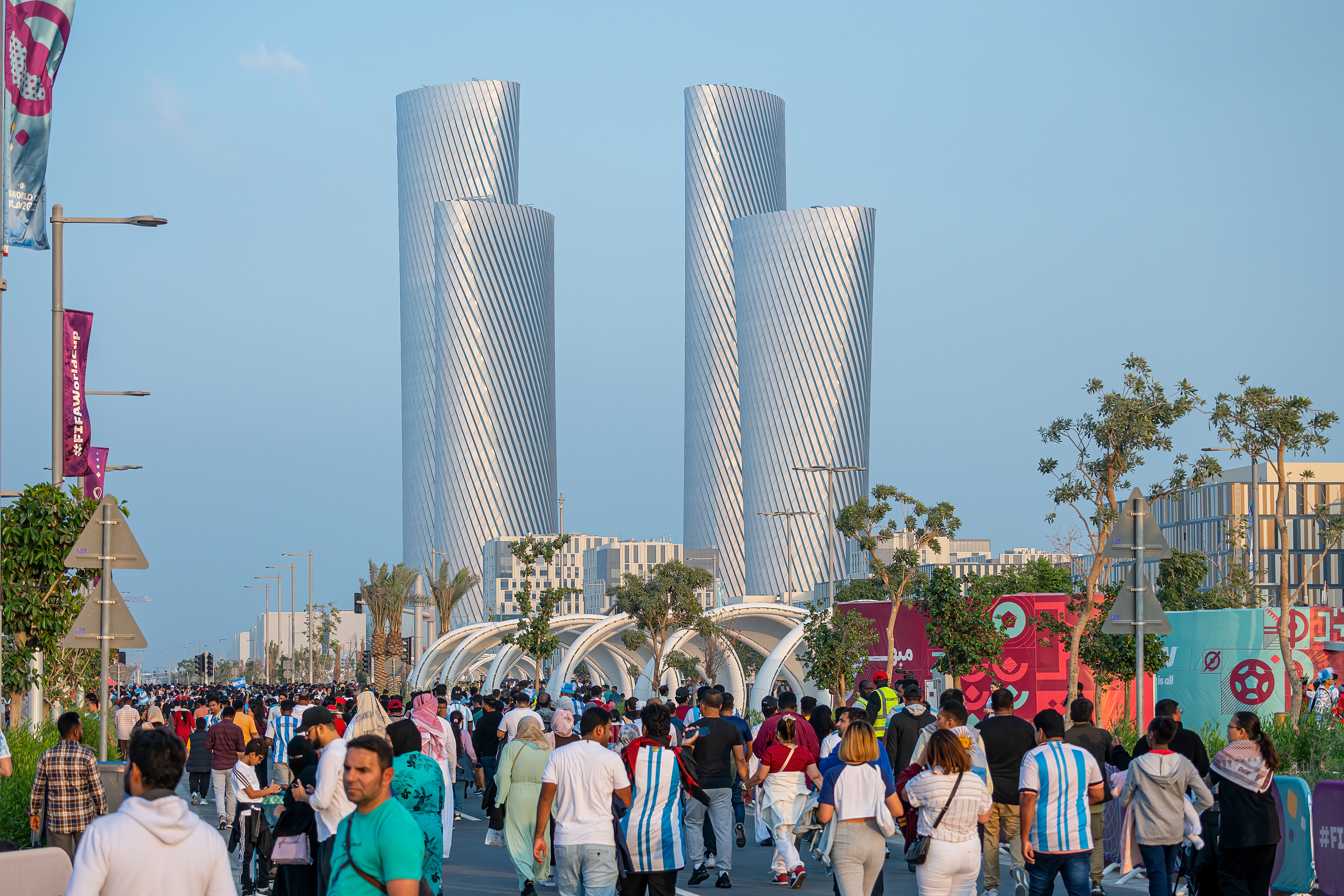The FIFA World Cup 2022 in Qatar is now well under way, yet the relentless public debates around Qatar’s human rights record, be it regarding the rights of LGBTQ+ or the rights of migrant workers who built the infrastructure that underpin the competition, is not dying down. In fact, the whole build-up towards the event has been defined by an intense public scrutiny of Qatar, with civil society organisations and international labor unions engaging in continuous advocacy to report on and improve the living and working conditions of migrant workers active on Qatar’s many building sites.
Legislative and institutional reforms
This issue also attracted attention and critique from both the international media and public authorities all around the globe. In fact, the question of Qatar’s (lack of) compliance with internationally recognised human rights and core labor standards caused so much negative publicity and external pressure that a number of legislative and institutional reforms were initiated, officially aimed at improving the rights and standing of migrant workers in Qatar. While it is highly disputed whether these reforms have led to actual changes on the ground or should be seen only as window-dressing, it remains clear that the global public attention brought to Qatar by its hosting of the FIFA World Cup 2022 has forced the Qatari authorities to engage legislative reforms and pay at least lip service to the concerns raised.
International human rights law and international labor law
In spite of the fact that this issue continues to play a major role in the transnational public discourse, it received until now relatively scant attention in the academic literature, specifically in the international/transnational legal field. Yet, the debates around the Qatar 2022 World Cup are in practice mobilising a range of legal arguments connected to the interpretation and application of international human rights law and international labor law, as well as activating international (at the ILO) or transnational (at the Swiss OECD National Contact Point) legal processes. Furthermore, they raise well-known questions regarding the compliance of states with international legal commitments and connect with debates on the universality of human rights and their translation in particular social contexts. In short, we believe there is room for a multi-disciplinary engagement with the legal processes and social mobilisations triggered by Qatar’s successful bid to host the FIFA World Cup 2022 and their impacts on local social and legal rules and institutions. Hence, Qatar’s journey towards the FIFA World Cup 2022 constitutes an interesting case study to investigate more generally the transnational social and legal mechanisms which underpin the concretisation of international (human rights/labor) law in a particular context and give it a specific reality.
If you wish to participate in the workshop please contact Dr Antoine Duval.
Wednesday 15 February 2023
15:00 – 15:15 – Opening – Antoine Duval (Asser Institute), Daniela Heerdt (Asser Institute) and Zachary Calo (Hamad bin Khalifa University)
15:15 - 16:00 – Panel 1 – Between honor and shame: The spectacle of international law and the Qatar 2022 World Cup
- Provoking Honour in Defence of Human Rights: Qatar and its Response to Naming and Shaming at the 2022 FIFA World Cup - Carl Lewis (Asser Institute)
- Spectacular International Labour Law: Leveraging ambush counter-marketing for transnational labour rights - Antoine Duval (Asser Institute)
16:00 – 16:15 - Break
16:15 – 17:00 – Panel 2: How FIFA enforced (or not) human rights in Qatar
- Assessing FIFA’s Human Rights Volunteers programme from a remedy perspective - Daniela Heerdt (Asser Institute)
- Title TBC - Mark James (Manchester Metropolitan University)
17:00 – 17:15 – Visualising the encounter between the Qatar 2022 World Cup and Human Rights – Maryam Touzani and Aaryan Sinha
Thursday 16 February 2023
9:00 – 10:00 – Panel 3: The Qatar 2022 World Cup and the tension between universality and relativity in human rights law
- Situating the debates from Qatar 2022 on the relativity-universality spectrum in human rights law and practice- Shubham Jain (University of Cambridge)
- Qatar, Human Rights and the World Cup: A view from the Third World - Faizan Ahmad (Jindal Global Law School)
- Universality in Obligation, Locality in Limitation:A Very “European” Duality on Qatar and Human Rights - Burak Yalım (Kocaeli University) & Dr. Itır Aladağ Görentaş (Kocaeli University)
10:00 – 10:15 - Break
10:15 – 11:15 – Panel 4: How the 2022 World Cup changed Qatar
- Sport Professionals in Qatar – an unheard story - Marko Begović (Union Nikola Tesla University) & Prof. Ilias Bantekas (Hamad bin Khalifa University)
- Qatar and FIFA World Cup 2022: A Vehicle for Revolutionary Labor System Reform - Mohamed Ghozayel (Hamad Bin Khalifa University)
- Dispute System Design and LaborRights: Lessons from Qatar - Zachary Calo (Hamad bin Khalifa University)
11:15 – 11:30 – Break
11:30 – 12:15 – Panel 5: Learning from Qatar: The Future of human rights at mega-sporting events
- A Human Rights Legacy Formula - Andy Spalding (University of Richmond School of Law)
- Making Rights Truly Global: Soft Law Potential of Sports and The Role of FIFA in Advancing Human Rights - Nishant Sheokand (Vinayaka Mission’s Research Foundation University, Tamil Nadu, India) and Shambhavi Thakur (University of Melbourne)
